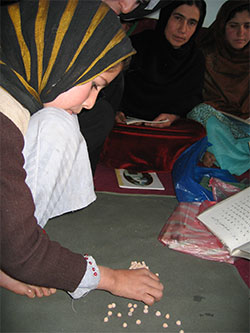Surviving A Bombing: An Educator Undeterred
To anyone who knows Dana Burde, her narrow escape from being killed by suicide bombers in Amman, Jordan, in early November, could not be more fraught with irony.
Burde, who earned her Ph.D. at Teachers College and still teaches courses here through the Department of International and Transcultural Studies, is an Associate Research Scholar at Columbia's Saltzman Institute for War and Peace Studies. She has devoted her career to bettering the lives of people who have been affected by war -- the very constituency suicide bombers typically claim to represent. Her chosen means is "education in emergencies" -- relief work that seeks to provide immediate education services, rebuild school systems, and thereby forestall extremist movements, in displaced societies. She was in Amman for a meeting of researchers involved in a massive survey to assess how well the U.N. is meeting the needs of registered refugees in the region.
"Refugee camps occupy a strange place in the world of relief efforts," said Burde, reached in Afghanistan a few days after the bombing, which obliterated a wedding party 30 feet from where she was standing in the lobby of the Amman Radisson. "Kids live there for years, but social services are still provided on an ad hoc basis. The result is that, until recently, no one really focused systematically on their educational needs. That's made refugee camps an even likelier breeding ground for discontent."
Burde personally witnessed the birth of the emergency education field in the late 1990s in Bosnia, where she was working for Save the Children while studying for her Ph.D. in Comparative and International Education. The organization had a preschool program that was "incredibly well received," and as the Balkan conflict was winding down, other agencies began picking up on it as a model. For the young researcher, it was a revelation.
"I was already interested in how societies reorganize after conflict," Burde said. "It just struck me that there had been a huge gap in humanitarian relief activities and that international organizations needed to promote education in these circumstances with the same sense of immediacy that more traditional emergency relief -- food, health care -- is supplied during and after crises."
While suicide bombings often are carried out by educated people, a lack of education can create a climate of support for the motivations, if not the methods, of the bombers, Burde said.
"There was a suicide bombing here just three hours ago," she said during the phone call from Kabul, where she had gone in the fall to start a research project exploring the links between education, protection and life chances for adolescents during early reconstruction. "That didn't happen before the U.S. went into Iraq. Suicide bombing wasn't a common Taliban technique, and most Muslims consider it a shocking violation of Islam. Now we are seeing many Taliban being trained by fighters in Iraq. So you can see the conflict here changing in ways that are significant and disturbing. And that's partly because the U.S. has chosen to prosecute its war here through warlords and drug lords, who don't have much concern for human rights."
At the same time, Burde said, the U.S. and other governments play into the hands of the terrorists when they "overreact" to bombings by curtailing civil liberties and violating citizens' privacy.
"This is precisely what the bombers want," she said. "These are almost never people who act alone. They are part of loosely connected organizations and have been indoctrinated in the thinking of those organizations, almost the way cult members are. Bombing is a strategy to polarize societies. It provokes overreaction which then creates resentment and fear among communities toward the military, decreases the likelihood of information sharing, and increases the pool of recruits to try to force out the occupier."
In Amman, Burde said, the bombers' intended targets were Jordanians, not foreign tourists. "People think Jordan was targeted because of its close ties to the U.S. and its perceived facilitation of military activity in Iraq," she said.
The experience left her shaken, but her anger was directed primarily at the media as well as at the attackers, because she felt they focused on the sensational aspects of the Amman bombing and made sweeping generalizations about Muslims and Middle Easterners. In one instance, a newspaper also published her picture after promising not to, further compromising her safety.
Still, if there's one thing the bombers in Jordan did not accomplish, it was to change Burde's views or career plans.
"I don't work that way," she said when asked whether the experience had shaken her determination. "We're seeing that force is a quick fix that doesn't work. I'm going to keep working the slow way -- through education."
Published Monday, Dec. 19, 2005
